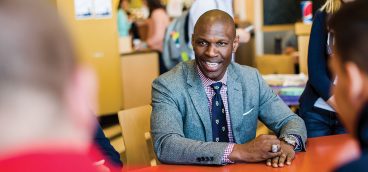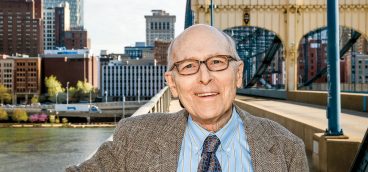
Like so many others in the Pittsburgh area, my grandparents on both sides emigrated from Poland to the United States in the early part of the 20th century. Think about the journey they made.
They were going to a place about which they knew nothing. They didn’t know the language. It must have been very scary.
Their children—my parents—were both products of the Great Depression. From that experience, my mom and dad learned the value of hard work. And even though neither had much formal schooling, from day one they emphasized to all five of their children the importance of education.
In addition to my parents, a number of Pittsburghers went out of their way to put us on the right path, starting with my high school football coach. My two brothers and I all played at North Catholic. We had good grades and the coaches pushed all three of us toward good schools. They sent Ivy League coaches our way when they came recruiting. Frank went to Yale, and Dave to Pitt. When I applied to Yale myself, the Pittsburgh alumni got behind my application. I’m sure they had a lot to do with my getting in. So we all worked hard and, fortunately, people helped us.
My time at Yale was a defining experience for me. When you grow up in the working class, you become all too aware of limitations. You get to know the blue-collar way of life: work hard, love your family and don’t expect too much. But when I went to Yale, all of a sudden I was in a world where there were no limitations. I remember on one of my first days there, talking to another freshman about the future. He wanted to be president of the United States! Now, he didn’t become president, but the point was that he thought it was possible. That was a real eye-opener.
By the time I graduated, I had done well in the classroom (and, incidentally, on the football field). I learned how to write, which was probably the most important thing I took away from Yale. I then went to grad school at Harvard to study business and got a broad perspective of the world and the tools that I’d need to have a chance to make it. Then, like so many, I went to Wall Street.
In the 1970s, Wall Street was very different from what it has been in recent years. From 1970 to 1980, I think the Dow Jones went from about 750 to 752. But I got some very good experience as far as what it takes to raise money and to put it in place. Around 1980, I was asked to take over the real estate group at Paine Webber. I built up that group and then took over investment banking around ’84. Now, the ’80s were a very active decade in finance. I was not only doing deals, but was getting management experience as well. I found that I enjoyed building a team and setting a direction. But frankly, I didn’t want to wake up in 20 years and be just one of 10,000 investment bankers. It would have been easier just to keep doing what I was doing. But I wanted to create a franchise. To do that, I knew that I had to develop a clear vision about what I wanted and what I stood for. I had to discover a trend. During my 20 years on Wall Street, any number of trends developed, but I failed to recognize them. You see, most investment bankers tend to focus on what they’re doing day-to-day. In the end, I felt that I’d spent my time studying the tree when what I wanted to do would require a “whole forest” approach. That’s what got me thinking about Asia.
Back then, many people were beginning to assess Asia from the standpoint of prospective business. I did the reading, ran the numbers and quickly understood that half of the world’s population lived there. And the average age in Asian countries was in the low 20s, whereas in the U.S., Europe and Japan, the average was in the high 30s. The reason that the Asian economy has such high growth characteristics is because they’ve got this young population that’s spending money. It became very clear to me that, because of those fundamental demographics, the Asian region was likely going to be an exciting one for business well into the 21st century. To me, laying a stake in that kind of environment was much more appealing than what I had been doing.
I ended up making my first trip to Asia in the fall of 1990. I spent six weeks there, mostly in Hong Kong. What I saw happening on the ground matched what I’d been reading. There was a lot of activity. I made a series of trips back to Asia in 1991 and then picked up and moved to Hong Kong at the end of that year. Every step of the way, I was encouraged by what I was observing.
I probably spent that first year doing nothing but setting up an investment business with a partner from the U.S. While I was doing that, I kept my eye out for opportunities. Soon I realized that Asia was a very big region—many countries, all very different from each other. Unless you were an expert in all of them (and nobody really was or is), you simply had to pick one country and focus. Today, the choice would be easy. The focus is China. But back then, this wasn’t so clear.
From the outset, I considered a couple of things in Thailand and something in Sri Lanka. I was looking around the region and talking to a lot of people—including a very smart group of Chinese businessmen. What struck me was that they spent five minutes talking about their business in Hong Kong and 25 minutes talking about what they were trying to do in China. I thought, “Well, these people seem to be looking to China. Maybe that’s where I should go.” So I made my first trip there in September of 1992. And then, when I started to really understand what was happening in China, I got very, very excited. The possibilities were staggering.
You must understand that, at the time, very little news was coming out of the country. China started its economic reform program in 1978. By 1992, when I went there, that program had close to a 15-year record of progress. In ’78, the Chinese said, “We’re going to do this.” And lo and behold, they did it. They had confidence in what they were doing because of their enormous success in terms of lifting hundreds of millions of people out of poverty. Of course, people said then, and continue to say, “China’s interesting, but the government could always reverse course and take things away.” In my opinion, that political risk—while you can’t ever say it’s not there—is a lot lower than most people think. As China developed, it was becoming more entrenched in the global economy, not less so. And it was clear to me that the more progress China made, the more it would need the rest of the world. It needed the export market and capital and technology from the West. China needs the world, and the world needs China. That’s the story, really.
Through the years, I’ve become convinced that China will change the ground rules for almost every industry. It’s a game-changer, just like the U.S. was when its economy first boomed. I won’t say that I haven’t been lucky. But I am proud to have recognized earlier than most the significant role that China would play in the global economy.
Sure, I’ve had ups and downs during my years there. I had much to learn and learned it, sometimes painfully. But wouldn’t I have had ups and downs anywhere? Today, ASIMCO Technologies, which I built from the ground up over the last dozen years or so, does half-a-billion dollars in sales annually. And we’re not finished yet. With 17 factories in eight provinces and 52 sales offices located in every corner of the country, we’re one of the most important players in China’s automotive components industry.
Unfortunately, my father passed away in 1995, and therefore never got to see the full flower of what I was doing. But for somebody who didn’t have much education, who grew up in very limited circumstances, he was a pretty broad-minded, smart and supportive person. My mother is extremely proud. She’s always bragging when talking to friends. Again, she doesn’t necessarily understand completely what I’m doing, but she did come to China around 1996 to see for herself.
Imagine: When I went to Harvard, there were no PCs or laptops. No Microsoft. No Google. And that’s barely 40 years ago. So forget about what China is today. It’ll be different tomorrow. It’s constantly changing. Instead, think about the kids who now are graduating from college. What will their world look like 40 years from now? It will be very different. To succeed, they’ll have to accept and embrace change faster than we did and be more open-minded and creative from the start. If they do, I have confidence that they’ll all find places for themselves in their new world.





